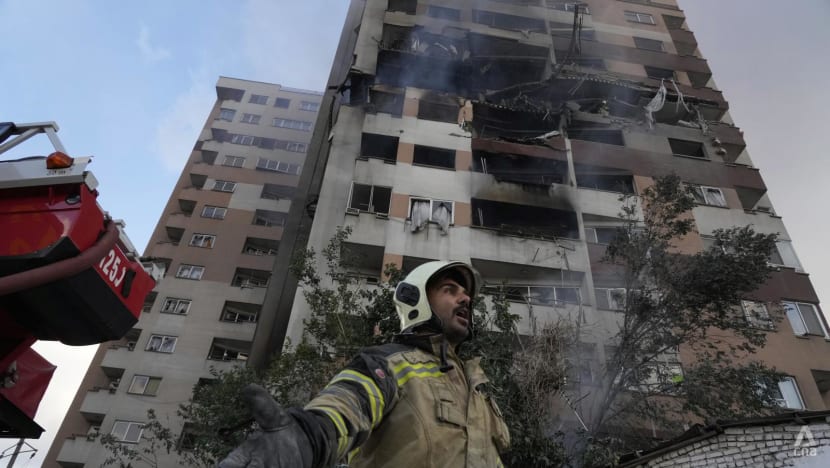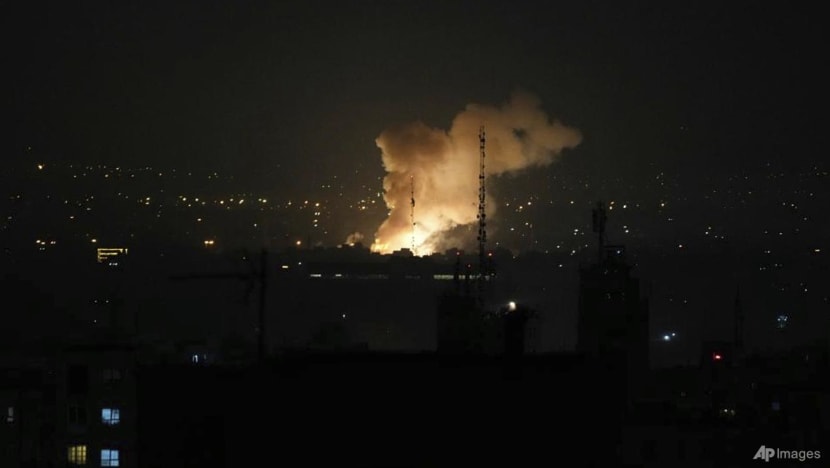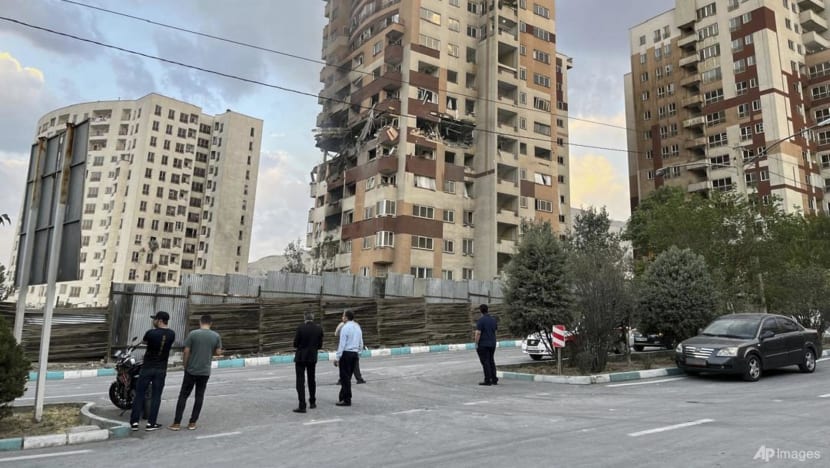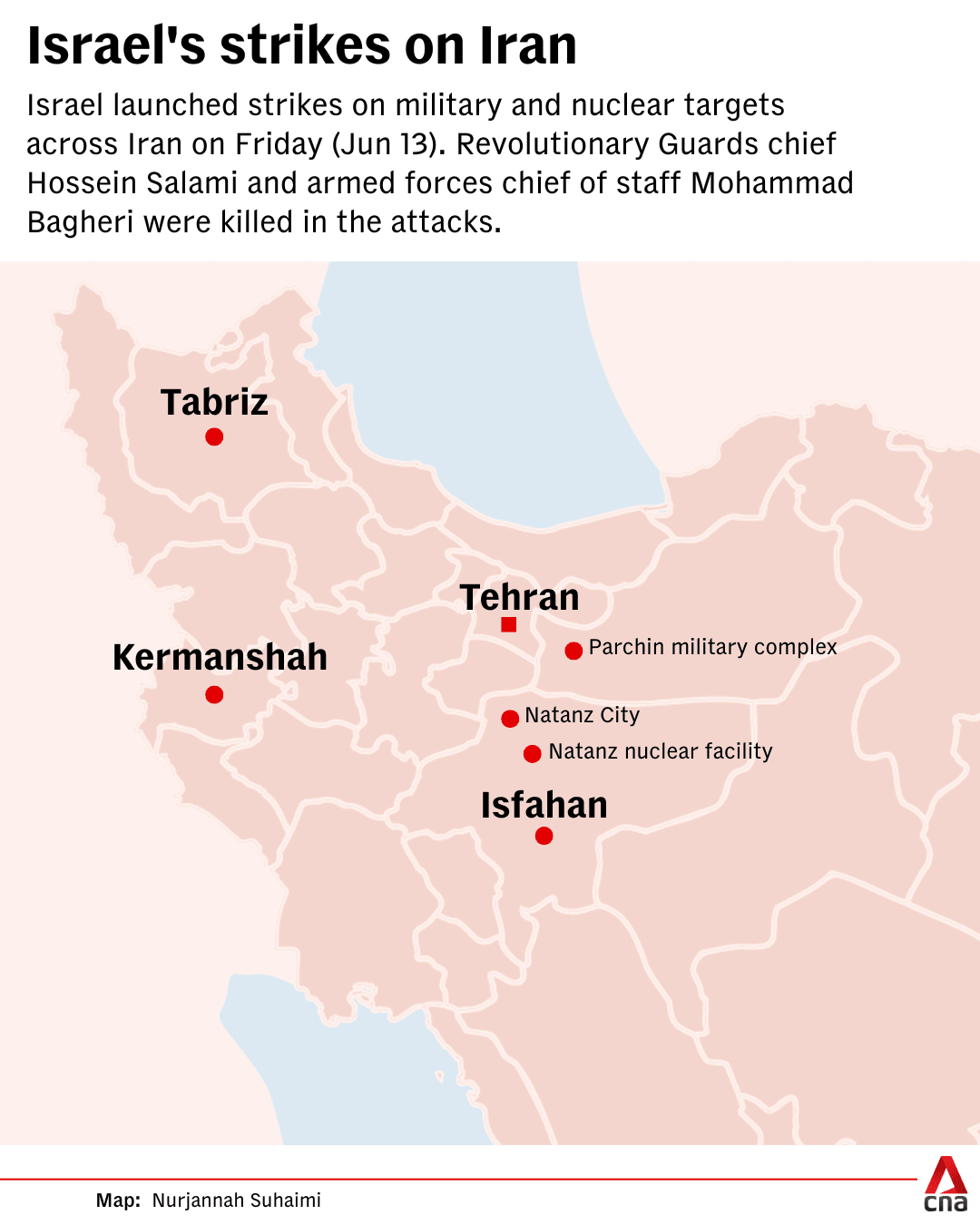Israel strikes Iran as Netanyahu warns of further attacks
Iranian state television reported that Hossein Salami, the chief of the elite Revolutionary Guards corps, had been killed.

A firefighter calls out his colleagues at the scene of an explosion in a residence compound in northern Tehran, Iran, on Jun 13, 2025. (Photo: AP/Vahid Salemi)
JERUSALEM: Israel carried out strikes against Iran on Friday (Jun 13), targeting its nuclear plant and military sites, as Prime Minister Benjamin Netanyahu warned of further attacks.
Explosions were heard on Friday morning in the Iranian capital, state TV reported, adding that Iran's air defence were at "100 per cent operational capacity".
Iranian state television reported that Hossein Salami, the chief of the elite Revolutionary Guards corps, had been killed and the unit's headquarters in Tehran had been hit. Several children had been killed in a strike on a residential area in the capital, it said.
"We are at a decisive moment in Israel's history," Israeli Prime Minister Benjamin Netanyahu said in a recorded video message.
"Moments ago Israel launched Operation Rising Lion, a targeted military operation to roll back the Iranian threat to Israel's very survival. This operation will continue for as many days as it takes to remove this threat."
"We struck at the heart of Iran's nuclear enrichment programme. We targeted Iran's main enrichment facility at Natanz ... We also struck at the heart of Iran's ballistic missile programme," he said, adding that Israel had also hit Iranian nuclear scientists "working on the Iranian bomb".

An Israeli military official said Israel was striking "dozens" of nuclear and military targets. The official said Iran had enough material to make 15 nuclear bombs within days.
Alongside extensive air strikes, Israel's Mossad spy agency led a series of covert sabotage operations inside Iran, Axios reported, citing a senior Israeli official. These operations were aimed at damaging Iran’s strategic missile sites and its air defence capabilities.
Iran's Chief of Staff Mohammad Bagheri was "likely eliminated", said an Israeli security official.
Air traffic was halted at Tehran's main international airport Imam Khomeini, while neighbouring Iraq has also closed its airspace and suspended all flights at all airports, state media reported.
Israel declared a state of emergency, with Defence Minister Israel Katz saying that retaliatory action from Tehran was possible following the operation.
"Following the State of Israel's preemptive strike against Iran, a missile and drone attack against the State of Israel and its civilian population is expected in the immediate future," Katz said.
Tel Aviv's Ben Gurion Airport was closed until further notice, and Israel's air defence units stood at high alert.
An Israeli military official added that the Israeli army believed that Iran had the ability to strike Israel "any minute".

US NOT INVOLVED
US Secretary of State Marco Rubio said Israel acted unilaterally because it believes the operation was necessary for self-defence.
"Tonight, Israel took unilateral action against Iran. We are not involved in strikes against Iran and our top priority is protecting American forces in the region," Rubio said in a statement.
"Let me be clear: Iran should not target US interests or personnel," he added.
US President Donald Trump was convening a meeting of the National Security Council on Friday morning, the White House said.
Israeli military Chief of Staff Eyal Zamir said tens of thousands of soldiers had been called up and "prepared across all borders".
"We are amidst a historic campaign unlike any other. This is a critical operation to prevent an existential threat, by an enemy who is intent on destroying us," he said.
Crude oil prices jumped as the strike on Iran hammered global stocks and drove investors into safe-haven assets.

US and Iranian officials were scheduled to hold a sixth round of talks on Tehran's escalating uranium enrichment programme in Oman on Sunday, according to officials from both countries and their Omani mediators. But the talks have appeared to be deadlocked.
Trump said on Thursday an Israeli strike on Iran "could very well happen" but reiterated his hopes for a peaceful resolution.
"I don't want to say imminent, but it looks like it's something that could very well happen," Trump told reporters at the White House Thursday when asked if an Israeli attack loomed.
Trump said he believed a "pretty good" deal on Iran's nuclear programme was "fairly close", but said that an Israeli attack on its arch foe could wreck the chances of an agreement.
The US leader did not disclose the details of a conversation on Monday with Netanyahu, but said: "I don't want them going in, because I think it would blow it."
Trump quickly added: "Might help it actually, but it also could blow it."
US intelligence had indicated that Israel was making preparations for a strike against Iran's nuclear facilities, and US officials said on condition of anonymity that Israel could attack in the coming days.
Israel has long discussed striking its longtime foe Iran in an effort to block Tehran from developing a nuclear weapon.
Jonathan Panikoff, director of think-tank Atlantic Council's Scowcroft Middle East Security Initiative, said the timing of the strikes meant that Netanyahu believed Israel could not wait for the US to complete its negotiations with Iran.
He said the Iranians see their nuclear programme as "almost existential" for them, while the Israelis see it as a threat to its long-term security.
Hence, Tehran’s response could be stronger compared with its ballistic missile and drone strikes against Israel in April and October last year, he said, adding that Iran could use its proxies such as Iraq-based militia groups and the Houthis to launch retaliatory attacks.
Panikoff noted that Rubio’s remarks - which did not back or criticise Israel's action - came as a surprise, as Washington usually issues a statement of support for Israel in such situations.
However, this does not mean that the US would not defend Israel, he said.
“I almost certainly think the US is going to (defend Israel), but it is a real question mark about the status of the current Israel-US relationship based on tonight's actions by Netanyahu,” he told CNA's Asia First programme.
The US military is planning for the full range of contingencies in the Middle East, including the possibility that it might have to help evacuate American civilians, a US official told Reuters, speaking on condition of anonymity.
The US on Wednesday said it was reducing embassy staff in Iraq - long a zone of proxy conflict with Iran.
"EXTREMIST"
Israel, which counts on US military and diplomatic support, sees the cleric-run state in Tehran as an existential threat and hit Iranian air defences last year.
Netanyahu has vowed less restraint since the unprecedented Oct 7, 2023 attack on Israel by Tehran-backed Hamas, which triggered the massive Israeli offensive in Gaza.
The United States and other Western countries, along with Israel, have repeatedly accused Iran of seeking a nuclear weapon, which it has repeatedly denied.
Israel again called for global action after the UN's International Atomic Energy Agency (IAEA) accused Iran on Wednesday of non-compliance with its obligations.
The resolution could lay the groundwork for European countries to invoke a "snapback" mechanism, which expires in October, that would reinstate UN sanctions eased under a 2015 nuclear deal negotiated by then US president Barack Obama.
Trump pulled out of the deal in his first term and slapped Iran with sweeping sanctions.
Iran's nuclear chief, Mohammad Eslami, slammed the resolution as "extremist" and blamed Israeli influence.
In response to the resolution, Iran said it would launch a new enrichment centre in a secure location.
Iran would also replace "all of these first-generation machines with sixth-generation advanced machines" at the Fordo uranium enrichment plant, said Behrouz Kamalvandi, spokesman of the Atomic Energy Organization of Iran.
Iran currently enriches uranium to 60 per cent, far above the 3.67-per cent limit set in the 2015 deal and close, though still short, of the 90 per cent needed for a nuclear warhead.

















